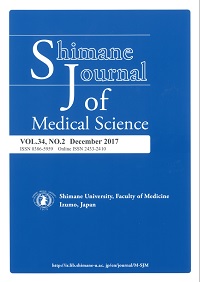Shimane University Faculty of Medicine
ISSN :0386-5959(冊子体)
ISSN :2433-2410(オンライン)


これらの論文は クリエイティブ・コモンズ 表示 - 非営利 - 改変禁止 4.0 国際 ライセンスの下に提供されています。
ダウンロード数 : ? 件
この文献の参照には次のURLをご利用ください : https://ir.lib.shimane-u.ac.jp/50690
Shimane Journal of Medical Science 37 2
2020-06 発行
Biologic Therapy Options for Crohn’s Disease
ファイル
内容記述(抄録等)
Crohn’s disease (CD) is an immune-mediated inflammatory intestinal disease of unknown etiology. In addition to conventional drugs such as 5-aminosalicylates (5-ASA), corticosteroids, and immune-modulating drugs, biologics targeting inflammation- and immunerelated molecules have been developed for treating CD. Initially, anti-tumor necrosis factor (TNF)-α antibodies were used for induction and maintenance therapies, and the clinical course of affected patients was dramatically changed because of their efficacy and safety. More recently, novel humanized biologics targeting the p40-subunit of interleukin (IL)-12/23 and α4β7-integrin have been developed, and shown to contribute to longterm therapy for CD. Although the efficacy of biologics for CD is widely recognized, how to determine which biologic is appropriate for individual patients remains largely unknown and additional studies are necessary to clarify this issue.
About This Article
DOI
DOI(SelfDOI)
権利関係
Faculty of Medicine, Shimane University
Other Article
PP. 57 - 60
PP. 61 - 65
